Nominees
Chicago
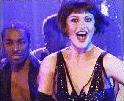
|
Recommendations
Caged (1950; dir. John Cromwell)
New York, New York (1977; dir. Martin Scorsese)
Caged is a sharp-edged little exploitation thriller that still represents classical Hollywood's most dignified pass at a genre that quickly became Roger Corman territory—that is, the women-in-prison flick. Eleanor Parker stars in this one as the mousy widow/accomplice of a robber, forced to do time for driving her slain lover's getaway car. Parker earned an Oscar nomination for this performance, in a tough year: her competition included the stars of All About Eve and Sunset Boulevard (and they all lost to Judy Holliday!). Parker's challenge here is essentially to enter the jail as Roxie and exit as Velma—harder, meaner, and more darkly hedonistic. Hope Emerson, a six-foot-plus actress and sometime strongwoman, literally plays the "heavy" as the villainous, cash-swaggling, crypto-lesbian prison matron; a boxing match between her and Latifah would be tough to call. Agnes Moorehead's around, too, as the well-meaning but embattled warden. See this one for the deceptively simple performances, the tense compositions, and the clarion feminist protests that only become clear (and always fierce, even pessimistic) in the last act.
Meanwhile, though New York, New York, was Martin Scorsese's first big box-office flop, it is nonetheless a stellar WWII-era musical, led by Robert De Niro as a temperamental saxophonist and Liza Minnelli as the ex-USO chanteuse who casts her lot with him, professionally and romantically. The economic failure of New York, New York was a major nail in the genre's coffin, which Moulin Rouge and Chicago have only recently pried back open. But forget all the bad-mouthing: NY,NY is one of Scorsese's very best movies, astonishingly heartfelt, grandly imagined, and perfectly cast. When Minnelli's character finally wriggles her way out from under De Niro's svengali, she lets loose with some classic, rousing musical numbers you won't soon forget (including "The World Goes Round" and the title song, which everyone forgets is from this movie). Make sure to catch the full director's cut, which also features a 20-minute musical set piece starring Minnelli that was trimmed from the theatrical release.
|
Gangs of New York
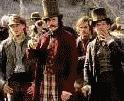
|
Greed (1925; dir. Erich von Stroheim)
In a sense, Greed is an impossible movie to see, since eight of its original 10 hours were burned before its release and never recovered. (The melted silver nitrate was reportedly used to make bullets.) But the two hours that survive of this silent, naturalist masterpiece are a memorable experience—much more convincing and, given the time period, even more ambitious than Gangs as a portrait of American communities and identities being birthed through avarice and violence. Gibson Gowland stars as the gold prospector who taps out in the mountains but unexpectedly wins the lottery. Conflict, of course, immediately ensues, both with his wife, played by the immortally named ZaSu Pitts, and with a nasty, money-grubbing antagonist played by Jean Hersholt. (Ironically, most of us remember Hersholt today for the eponymous Humanitarian Award bestowed every few years by the Academy.) The most famous and most grueling sequence in Greed is a lethal, climactic brawl between Gowland's and Hersholt's characters in Death Valley, a mise-en-scčne virtually duplicated in the final DiCaprio/Day-Lewis standoff in Gangs. This movie might be slow going if you're turned off by silent movies, but it may just as easily change your mind about them: it is long and bitter, but also exciting, ferocious, and powerfully filmed.
|
The Hours
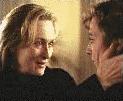
|
A Woman Under the Influence (1974; dir. John Cassavetes)
Opening Night (1978; dir. John Cassavetes)
Two of my absolute favorite movies. John Cassavetes' films are sometimes called an acquired taste, since the extravagant, improvisational flavor of the acting and looseness of the plot are not universally palatable. But I, for one, acquired the taste immediately after seeing these two films starring Cassavetes' wife, Gena Rowlands, who's due for a Lifetime Achievement Oscar any day now. In A Woman Under the Influence, for which Rowlands and director Cassavetes were both Academy-nominated, she stars as Mabel Longhetti, a working-class housewife whose playful, manic version of motherly love spooks her family and her neighbors, leading eventually to her needless institutionalization. In Opening Night, Rowlands appears as a famous, alcoholic theater actress whose routines are shattered by the death of a devoted fan she didn't even know (a scenario directly reprised in Almodóvar's All About My Mother). The films together offer a hugely affecting and indelible meditation on artistry, illness, family, and the gender politics of all three, themes which also figure centrally in The Hours.
|
The Lord of the Rings: The Two Towers

|
Lawrence of Arabia (1962; dir. David Lean)
Aliens (1986; dir. James Cameron)
Atanarjuat (The Fast Runner) (2001; dir. Zacharias Kunuk)
Jackson's Tolkien trilogy has reached such a huge audience by now that it's difficult thinking of a movie that would satisfy such a broad spectrum of tastes. If any movie is up to that challenge, though, Lawrence of Arabia probably is. Like The Two Towers, it is a gripping adventure yarn, finding the drama (as Towers less successfully aims to do) not just in combat but in the long, ethically weighty treks required to get there. Tolkien's corrupting Ring of Power might easily encompass the lurking cloud of British Imperial ambition, which Lawrence only gradually discovers was the impetus behind his deployment. Claude Rains is hardly Saruman—for one thing, he's better shaven—but the stakes of world domination are hardly beyond comparison. Meanwhile, for more adventurous renters, I have suggested Zacharias Kunuk's Atanarjuat (The Fast Runner), from just last year; a three-hour movie in Inuit (the language of "Eskimo" people) may sound like a turn-off, but the physical, romantic, and spiritual adventure that unfolds within it is a real grabber, I swear. And James Cameron's Aliens, another perennial favorite of mine, mostly appears here as a jab at the only-passable Two Towers: Cameron's is a sequel that knows much better how to deepen and expand a trilogy midstream, with no loss in visceral excitement (no pun intended).
P.S. If you're really willing to try something different, the recent Metropolitan Opera production of Verdi's Nabucco, or any recorded version of the same opera, offers a provocative reflection of LOTR:TTT in a different medium, but with a fantastic twist. The "towers" in question are ancient Babylon and Israel, locked in a duel that turns importantly around an ambitious swordswoman (and eventual queen) named Abigaille: exactly the commanding, capable, absorbing character that Miranda Otto and Liv Tyler have tried but so far failed to be for Jackson.
|
The Pianist
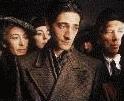
|
Shame (1968; dir. Ingmar Bergman)
Mephisto (1981; dir. István Szabó)
To me, the most interesting thing about Polanski's The Pianist is its grappling with this question: what happens to art, or the artistic impulse, in times of horrendous war? As we are forever demonstrating, the United States is not always the source of clear, morally defensible reflection on war. So, following Polanski's lead, I'd suggest looking at two other European artists who have tackled this question from different directions. Bergman's Shame, one of his most arresting movies, stars Liv Ullmann and Max von Sydow as married concert musicians. Their tense, incommunicative relationship seems like the beginning of yet another Bergmanish domestic free-fall. But then, halfway through the film, at a completely unpredictable moment, armed guerrillas storm their house and throw them in prison, leading to a long series of outrages—internment, separation, systematic killing—that, as in The Pianist, are only revealed to us as the characters themselves encounter them. Szabó's Mephisto, the Oscar winner as Best Foreign Film in 1981, follows a volcanic, self-absorbed, but talented German actor whose onstage triumph as Mephistopheles in Faust earns the favorable attention of Nazi officers. The rising regime offers the actor money, power, and a symbolic role in the nation's artistic firmament, all of which he greedily accepts on the premises that Nazism will prove a fleeting phenomenon, and that art is a higher force that politics cannot contaminate. But guess what? He's wrong.
|
Talk to Her
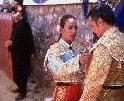
|
Vertigo (1958; dir. Alfred Hitchcock)
Persona (1950; dir. Ingmar Bergman)
High Heels (1991; dir. Pedro Almodóvar)
Talk to Her is such a brilliant but elusive movie—Did he really do it? Was she really planning to go back to him? Who was that swimmer, anyway?—that, to my mind, its closest analogues are other movies where the directors miraculously manage to seduce us with gorgeous images that, beguilingly, don't add up. Vertigo would seem like a worthy choice if only for its serpentine, unpredictable plot and its expressive, almost overpowering use of color (sometimes rendered in the purely abstract, as in Jimmy Stewart's spiraling dream sequence). But more than that, the plot of Vertigo mirrors Talk to Her in privileging the riddle of what a man sees in a beautiful woman, and how he inflicts his own desire on her, and how perhaps invariably, we only understand other people as projected versions of ourselves. Bergman's Persona picks up these same questions in different form, but orients its central relationship between two women. Persona also asks, as Almodóvar does, about the hidden power stakes in "caretaking" relationships.
I don't doubt that Talk to Her is a major cinematic achievement, deserving of the company of Hitchcock's and Bergman's masterpieces. Within Almodóvar's own body of work, the first signs I can discern of Talk to Her's ambitious blend of drama, moral provocation, and muted comedy are in High Heels, a sad farce about a mother and daughter in love with the same man, who turns up dead. Victoria Abril, made famous as a fizzy commedienne for Almodóvar's earlier movies, cuts right to the heart in this one, especially in a central scene on a live TV-news broadcast. If you discovered (or rediscovered) Almodóvar through Talk to Her, almost anything in his oeuvre is a small step down, but High Heels is still a rewarding place to go next.
|
Nominees
Salma Hayek
Frida
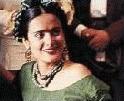
|
Recommendations
Timecode (2000; dir. Mike Figgis)
"Oscar-nominated actress Salma Hayek"? I never thought I'd hear it, but the first sign that it was at least possible was Mike Figgis' Y2K experiment in telling four related stories at once. Timecode's image is split into four quadrants, in which four separate, uncut takes, simultaneously filmed on handheld video cameras, tell four sides of a story about infidelity, ambition, revenge, and corporate boredom at a Hollywood studio. The narrative itself feels slim and eventually self-destructs entirely, inevitably overwhelmed by the technical curiosity of the format. But Hayek, as a lesbian actress willing to prostitute herself to a smarmy male exec (Stellan Skĺrsgĺrd) in exchange for a breakthrough role, is one of the few performers who really breaks through with a memorable turn. The other is Jeanne Tripplehorn, offering even more proof that you can't always judge an actress by her lame portfolio. Also on hand: Holly Hunter, Saffron Burrows, Alessandro Nivola, and Xander Berkeley.
|
Nicole Kidman
The Hours

|
Flirting (1989; dir. John Duigan)
Kidman is only a major supporting character in this tiny Australian picture, which is primarily a teenage romance between future stars Noah Taylor (Shine, Max) and Thandie Newton (Beloved, The Truth about Charlie). But the film remains a must-see because a) Kidman is great in her smallish part, playing a frosty prep-school princess without making her a bitch or a caricature, b) Newton and Taylor are even better, making their characters' sweet flirtations utterly charming, and c) the film itself shows admirable awareness of wider worldly realities, a sober wisdom best exemplified when Newton's expatriate family must return to Uganda at the height of Idi Amin's reign of terror. A delicious movie that puts John Hughes to shame and launches a passel of strong youth performers on the road to later success. (Look, too, for an almost unrecognizable Naomi Watts.)
|
Diane Lane
Unfaithful

|
A Walk on the Moon (1999; dir. Tony Goldwyn)
Diane Lane had done the whole tortured-adulteress thing before, and in classier, funnier, warmer fashion. A Walk on the Moon finds Lane's Pearl Kantrowitz vacationing with her family in the Catskills, near Woodstock, in the summer of '69. As in Unfaithful, Lane's character finds herself committing some extra-marital heavy petting, not out of any single grievance with her life routine except that it is a routine, and she wants a taste of what's outside it. If Lane is even better here than in her studio breakthrough, the reason is partly—ta da!—a better script. A Walk on the Moon stays away from the hysterical pathos of revenge killings; instead, Pearl must justify her behavior to a teenage daughter (Anna Paquin) whose adolescent sexual confusions are hardly dispelled by Mom's philandering. Also, Lane has better actors to play with than Richard Gere and Olivier "Theese Moment Eez Your Life" Martinez. Beyon Paquin, Viggo Mortensen is the other man (and who wouldn't cheat with Aragorn?), Liev Schreiber is great as the pained husband, and Kissing Jessica Stein's Tovah Feldshuh is a colorfully disapproving mother-in-law.
|
Julianne Moore
Far from Heaven
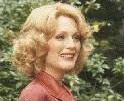
|
Safe (1995; dir. Todd Haynes)
Moore is brilliant for writer-director Haynes in Far from Heaven, but if you can imagine it, she was even more brilliant for him in Safe, their satire-cum-horror-story about urban alienation, epidemic paranoia, and pernicious "self-help" easyspeak in the Reaganite 1980s. Moore has to play a character named Carol White whose body is depleting for reasons no one knows. She has just as little dialogue to work with as Adrien Brody does in The Pianist, and the creeping sense of terror is surprisingly equivalent in both films. In fact, Haynes, in his own way, is making a film about offscreen genocide, since timely reverberations of the AIDS epidemic ring all across the picture. All in all, as in Far from Heaven, the intersection between Moore's powerfully interiorized mode of acting and Haynes' intellectualized approach to popular genres (the melodrama, the horror-mystery) generates unforgettable filmmaking.
|
Renée Zellweger
Chicago
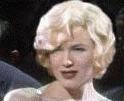
|
The Whole Wide World (1996; dir. Dan Ireland)
I can't say I think The Whole Wide World is a great film, but Zellweger fans will be interested to see it if they haven't already. Filmed just before Jerry Maguire and mini-released in the wake of that movie's success, Zellweger plays Novalyne Price, an aspiring writer in Depression-era Texas who meets Robert E. Howard, the raging author of the Conan stories. Howard, as played by Vincent D'Onofrio, is unpredictable and often bellicose, but he is the only figure in Novalyne's world who echoes her yearnings to write. Their quasi-affair is sad and mutedly interesting; it might be more so if the script were a little bolder, or if Zellweger brought a tad more punch to her role. (Ann Wedgeworth does much more with a tiny part as D'Onofrio's mother.) But the trademark Renée mannerisms are already there—the squinting, the swiveling head, the voice raised high and cracking in indignation—and it's odd now to see this marquee actress in an earlier, indie life to which I doubt, post-Chicago, she will quickly return.
|
Nominees
Adrien Brody
The Pianist

|
Recommendations
King of the Hill (1993; dir. Steven Soderbergh)
I still haven't caught those films before The Pianist where Brody had a large role, though I hear good things about TenBenny, Restaurant, and Spike Lee's Summer of Sam. I adore Terrence Malick's The Thin Red Line, but Brody's part in that ravishing poem on war was notoriously cut to almost nothing. So, I've settled for a mid-level part, not a lead but hardly a cameo, in another film I love called King of the Hill. Not to be confused with the Fox-TV animated series, this King is a 1930s fable about two young boys struggling to make ends meet in a low-end hotel after their father abandons them and their mother is hospitalized. It sounds grim, and occasionally it is, but director Steven Soderbergh, well before his A-list breakthrough era, does a marvelous job of capturing the resilient spirit of early childhood; it isn't an insult to put King of the Hill next to The 400 Blows or The Wizard of Oz, and that's saying a lot. Jesse Bradford, recently of Bring It On and Swimfan, is touching in the lead part, and Brody is a pleasurable kick as Bradford's older buddy Lester, a twentysomething miscreant who teaches him how to pick locks, "borrow" automobiles, and other underhanded but valuable tricks.
|
Nicolas Cage
Adaptation

|
Face/Off (1997; dir. John Woo)
Much has been made of Adaptation as Nicolas Cage's return to form after a long, post-Oscar slog through increasingly dreary action fare that even fans of that genre were having a hard time swallowing. (See Snake Eyes, Windtalkers, Con Air...or don't. I didn't.) However, John Woo's Face/Off, made during the same era and shaped as a summer blockbuster, is in danger of being sandwiched in with those other, less ambitious projects. Face/Off, though, is a stick of dynamite, following its delirious conceit in which a villain played by Cage and a saintly cop played by John Travolta literally switch faces and personas. Travolta's performance is carried along by the clever plot mechanisms, but Cage actually imbues the film and its machinations with real emotion. He's a dastardly foe in the prologue, but his later sequences as a do-gooder trapped in a terrorist's body are surprisingly pure in their expressions of dismay. Plus, the whole movie's a hoot, with Woo's well-practiced action choreographies, nice art direction and sound design, and elegant support from Joan Allen, Gina Gershon, Alessandro Nivola, and Dominique Swain.
|
Michael Caine
The Quiet American

|
Mona Lisa (1986; dir. Neil Jordan)
Were you, like me, turned off by The Quiet American? Were you even more turned off by Michael Caine's painfully candid desperation to win an Oscar for it? There is something conspicuously puerile that is barely concealed under Caine's famously affable persona, a shiver of arrested adolescence that bloomed, perhaps unwittingly, in those queasy Quiet American scenes when he made love to a teenaged Vietnamese girl. Neil Jordan's Mona Lisa, by contrast, uses Caine much more effectively by encouraging him to play, in a few scattered scenes, a virtual icon of outright moral rot. As a pimp and a criminal power-player, Caine's role is never fully clarified by the plot, but the directness of his playing leaves us in no doubt of his character's essence. By the way, Mona Lisa came out the same year Caine won a Best Supporting Actor Oscar for the unimprovable Hannah and Her Sisters. The acting buzz about Mona Lisa itself was reserved for lead-player Bob Hoskins, who is indeed excellent, but Caine and debut performer Cathy Tyson, as an enigmatic prostitute, are just as impressive.
|
Daniel Day-Lewis
Gangs of New York

|
The Crucible (1996; dir. Nicholas Hytner)
Finding an overlooked gem in Daniel Day-Lewis' film career is a challenge. He makes so few movies that each one becomes, by default, an event. I was surprised that his last film before Gangs, 1997's The Boxer, didn't get more play, but I also thought it was a slack and inflated piece of moviemaking, so I won't direct you toward it. On the other hand, Hytner's The Crucible, released a year earlier, scored a few Academy nominations and some wider buzz, but it's rarely remembered as one of Day-Lewis' greatest movie roles. I think it is: he wends his way easily through Miller's gently stylized dialogue, and he projects just the right combination of decency and temptability. This is one black-toothed Puritan you can imagine wanting to roll in the hay with, and who might actually do it (and then repent). By the end of the piece, the play stumbles rather seriously; the final dialogue between the Procters is satisfyingly emotional, but rather terrifically off-topic, and the play suddenly sounds as hysterical as the witch-hunters. But Day-Lewis, along with luminous co-star Joan Allen, is appropriately heart-rending in his last big scenes, saving a play just when the script has gone wrong.
|
Jack Nicholson
About Schmidt

|
The King of Marvin Gardens (1972; dir. Bob Rafelson)
Jack Nicholson as an Everyman? I could only go so far with that idea in Alexander Payne's About Schmidt, but Jack's work from the 1970s makes the notion less preposterous than it might seem to fans of A Few Good Men or regular telecast watchers. Five Easy Pieces was the first great Nicholson performance I have seen, and Chinatown remains my favorite, but The King of Marvin Gardens is an interesting film that has faded from many memories and deserves resuscitation. Jack works at a radio station, and is trying to make it through life in an increasingly despondent decade by just laying low. His brother, played by Bruce Dern, and Dern's fiancée (Ellen Burstyn) have bigger dreams of sparkling success in Atlantic City, which they believe they can realize with a little monetary kick-in from Jack. But of course it all gets more complicated. Marvin Gardens would also make a good pair with last fall's City by the Sea, which cast Robert De Niro and James Franco in a similar scenario of moral isolationism vs. failed aspirations in a derelict vision of modern American economic decay. But Marvin Gardens holds up just fine on its own, anchored by Nicholson's terse under-playing, Dern's and Burstyn's measured excesses, and a thick coat of national melancholy that is just as palpable now as it was thirty years ago.
|
Nominees
Kathy Bates
About Schmidt
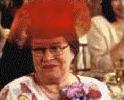
|
Recommendations
At Play in the Fields of the Lord (1991; dir. Hector Babenco)
It will be a shame if Kathy Bates' sharp, funny work in About Schmidt is only remembered as The Time She Took Off Her Clothes. The hot-tub scene is fun and well-played by Bates, but the dinner scene is funnier and better, and the glory of the whole performance is how well Bates renders an extreme character who is unaware of the full scope of her extremity. (Roberta probably knows she is unique, but does not understand that she is garish or dominating.) Bates' role in At Play in the Fields of the Lord, Hector Babenco's long, slightly pulpy epic of colonialism and missionary conversion in the Amazon basin, is similar in design though different in type. As the sour wife of John Lithgow's zealous Christian converter, Bates shows none of the humor that has defined her recent characterizations; the film has barely a comedic role in its body. But again, Bates is playing a nut who has no idea of the extent of her nuttiness, the futility of her goals, or the danger of her arrogance. The film is a strange, uneven hybrid of adventure yarn, historical epic, and retro-Hollywood racial fantasy (Tom Berenger as a transplanted, liquored-up Cherokee?) but it's one of those movies whose images and performances stay with you, Bates' included. And, she takes her clothes off.
|
Queen Latifah
Chicago
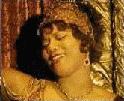
|
Set It Off (1996; dir. F. Gary Gray)
Living Out Loud (1998; dir. Richard LaGravenese)
The Queen keeps finding herself in movies that recognize they need her and then don't know what to do with her. Chicago fits that bill: she gets a showstopping number, and then spends the rest of her cameo-sized role being innocuous and "nice." Set It Off showed a similar limitation. Her gun-blazing, bank-robbing lesbian was the strongest creation in a smart, exciting film, but at a certain point, the film can't deepen her characterization or take it anywhere. She becomes a hotwired ornament, shooting sparks in the corners of rooms, while "safer" characters played by Jada Pinkett and Kimberly Elise take center stage. And Living Out Loud, Richard LaGravenese's offbeat and under-promoted 1998 feature, begins with a knockout rendition of "Lush Life" sung by the Queen, the camera orbiting lovingly around her. Her number beautifully sets a sweet-sad tone for the entire picture, but then the role becomes yet another Ethel Waters-ish, spunky 'n' soulful Black Sidekick within the main plot of Holly Hunter's semi-romantic friendship with Danny DeVito. Set It Off and Living Out Loud both have their raffish charms, and they both augur well for Queen Latifah's screen career, once she finds a film fully deserving of her monumental charisma. I think she's still looking, but in the meantime, these are fun and easy films to watch.
|
Julianne Moore
The Hours

|
World Traveler (2002; dir. Bart Freundlich)
Julianne Moore was deservingly recognized by the Academy this year for the double triumph of her performances in Far from Heaven and The Hours. But she actually delivered three impressive turns in 2002, the third and least recognized of them coming in World Traveler, the second feature by Moore's fiancé, Bart Freundlich. Like The Myth of Fingerprints, their first collaboration, World Traveler is a little too ambling for its own good, and it has a hard time breaking out of a certain register of upper-middle-class, white, J.Crew-ish angst. Billy Crudup's central performance also becomes an obstacle, but he does encounter some piquant supporting characters along the way: a peppy hitchhiker, a resentful former classmate, an affable construction-worker and his patient, challenging wife. The most memorable and unsettling of the stock figures on this weird Pilgrim's Progress through America is Moore's Gracie, a runaway beauty who is trying to find her child. The part is small, and blowzier than anything Moore has tried before—Jennifer Jason Leigh could easily have auditioned. But the gradual layering of the seemingly simple character, a Moore trademark, is an impressive feat—a signal to Moore fans that she's capable of even more "types" than we thought.
|
Meryl Streep
Adaptation

|
The Seduction of Joe Tynan (1979; dir. Jerry Schatzberg)
Ironweed (1987; dir. Hector Babenco)
Renting any movie with Meryl Streep is bound to be a good idea. In certain ways, though, she has had a notably strange career. She very rarely works with A-list directors, gravitating instead toward a second tier of promising filmmakers with short track records (Michael Cimino, Hector Babenco, Carl Franklin, and now Stephen Daldry and Spike Jonze) or with performance-centered directors who tend to make modest or uneven movies (Robert Benton, Alan J. Pakula, Fred Schepisi, Jerry Zaks, Pat O'Connor). And then, right when you least expect it, she turns up in a comedy. 1979 was a banner year for Streep, though her most heralded performance, in Kramer vs. Kramer, was her least interesting. Her small, witty cameo in Woody Allen's Manhattan boded well for her then-untested comic timing, as did The Seduction of Joe Tynan, a spritely but serious little political fable about a likable Senator succumbing simultaneously to political pressures and to a fetching, whipsmart campaign counselor played by Streep. Joe Tynan was written by its star, Alan Alda, and there is a softness to its "Liberalism Will Triumph" agenda that may seem naïve or off-putting, depending on your own positions. But as an adult comedy about national politics, the film should appeal to West Wing and American President fans, and Streep is totally captivating in an easygoing role. (If, however, you prefer the Meryl of High Drama, the most underappreciated of her Oscar-nominated turns is the one in Ironweed, opposite Jack Nicholson.)
|
Catherine Zeta-Jones
Chicago
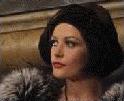
|
High Fidelity (2000; dir. Stephen Frears)
Catherine Zeta-Jones is a hard actress for me to get close to, partially because her ambitions seem so naked every time she's on screen. Chicago's Velma is almost too perfect a role for her: studied glamor and careerist yearning fit her so exactly that she, not just her character, seems jealous of all the time being spent on Roxie/Renée. I'm curious if this air of self-absorption clings to Zeta-Jones even in her early, TV-movie phase of playing romantic historical figures, in projects like Catherine the Great or the adaptation of Hardy's The Return of the Native, neither of which I have caught up with. On the big screen, my favorite Zeta-Jones moment has unquestionably been her brief role in Stephen Frears' High Fidelity, as the most luscious and intimidating of John Cusack's former girlfriends. The role is tiny but memorable and, typical of a Frears comedy, the mood is relaxed: he's actually coaxed Zeta-Jones into being funny and gorgeous without trying to own her scenes. The film as a whole is a little hit-and-miss, partially because it seems too close to Cusack's bland protagonist. But the movie is saved by its character actors: not just Zeta-Jones, but Jack Black, Joan Cusack, and Todd Louiso all do great ensemble work. A bit overrated, but easy to enjoy.
|
Nominees
Chris Cooper
Adaptation

|
Recommendations
Matewan (1987; dir. John Sayles)
Lone Star (1996; dir. John Sayles)
Chris Cooper has been hanging around a lot lately in big movies. A Time to Kill in 1996, American Beauty in 1999, Adaptation in 2002, and later this year, Seabiscuit, DreamWorks' big prestige picture, with Tobey Maguire. He even held together wonderfully in Alfonso Cuarón's 1998 remake of Great Expectations, which was otherwise hard to bear. For some audiences, Cooper entered this recent, unexpected run in the sun with a tremendous amount of stored-up good will, largely thanks to his lead roles in two movies by that socially conscious raconteur, John Sayles. In Matewan, Cooper plays an emissary from a national union trying to organize some West Virginia coal miners despite fierce, violent opposition from local management; in Lone Star, he is even more complex as a Texas sheriff trying to solve a long-buried murder, and discovering in the process some uncomfortable secrets about his own family history. Sayles gets a bum rap sometimes for being long-winded, or for caring too much about narrative at the expense of visual verve. But surely Matewan and Lone Star, at least, are exempt from these criticisms. The photography in each picture, by Haskell Wexler and Stuart Dryburgh, is ravishing. The supporting casts are embarrassingly talented: James Earl Jones, Mary McDonnell, David Strathairn, Elizabeth Peńa, Joe Morton, even a finely drawn cameo from Matthew McConaughey. And, if we haven't learned by now that national history and political conflict offer the deepest, most complex, most important stories around, we truly aren't paying attention.
|
Ed Harris
The Hours

|
Sweet Dreams (1985; dir. Karel Reisz)
The Third Miracle (1999; dir. Agnieszka Holland)
My favorite Harris performance—not necessarily "the best," but still my favorite—remains his incorrigible charmer and womanizer Charlie Dick, husband to Patsy Cline in the Karel Reisz biopic Sweet Dreams. When Harris was nominated two years ago for Pollock, that's the movie I invoked in this Rental Guide, and I still try to point people to it whenever possible. Loath to repeat myself, though, I will this time offer up Agnieszka Holland's The Third Miracle, an uneven but extremely interesting movie about a woman who may or may not be working holy miracles in 1970s Chicago. Statues of the Virgin start bleeding from their eyes when she dies, and plenty else happens that makes the church start asking questions. Harris stars as an agnostic priest called in to review the case, and though some aspects of the script seem contrived or poorly integrated, the film as a whole is pretty gripping. More than that, it's always interesting to see a character actor like Harris take center stage, and here, as in dubious genre work like China Moon, his unique blend of intellectual and carnal appeal manages to hold a movie together that keeps threatening to splinter apart.
|
Paul Newman
Road to Perdition

|
The Verdict (1982; dir. Sidney Lumet)
The Hudsucker Proxy (1994; dir. Joel Coen)
You have to hand it to Paul Newman: not only does he keep acting well into his seventies, even if it's just a movie every three or four years, but he has managed in his later decades to keep tackling challenging work. The grotesque falling-apart of Marlon Brando, the backlit softness of Robert Redford, and the virtual disappearance of Sidney Poitier are all counter-examples of the career tracks Newman has managed to avoid, even with major charitable and entrepreneurial endeavors to keep track of. 1982's The Verdict was an early sign that Newman would keep getting better with age. The screenplay, penned by David Mamet, goes back and forth between cliché and genuine surprise, but Newman's gripping turn as a lawyer who's his own worst enemy is a constant revelation. (Compare his version of spiritual crisis here to that in 1958's Cat on a Hot Tin Roof, and it's clear how much Newman has grown and improved.) Almost a decade later, The Hudsucker Proxy is perhaps the strangest movie yet from the Coen Brothers' factory (O Brother, Where Art Thou? is a strong rival), but Newman's funny work as the duplicitous head of the Hudsucker corporation is a winner. It also, like Road to Perdition, offers a rare demonstration of how well this star of many decades can still fold himself into the corner of an ensemble.
|
John C. Reilly
Chicago
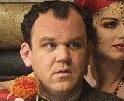
|
Georgia (1995; dir. Ulu Grosbard)
I can feel myself getting tired of John C. Reilly. Though much was made of his 4-for-4 output in 2002, with big roles in Chicago, Gangs of New York, The Good Girl, and The Hours, I still wouldn't call him a barnburner in any of them. His dim but honorable husband in The Good Girl was probably my favorite of the four, but it also reminds me of an earlier Reilly performance, before he had typecast himself so visibly as the clueless joe. The most important characters in Georgia are two sisters: Sadie Flood, a strung-out and mostly talentless rock singer, and her older sister Georgia, a straitlaced wife and mother with the voice of an angel and a renowned career as a folk crooner. Jennifer Jason Leigh and Mare Winningham are both marvelous, and often remembered as such. Less renowned in this small but powerful movie was the character work by great ensemble actors, especially Ted Levine (Buffalo Bill from The Silence of the Lambs) as Georgia's husband, Max Perlich as Sadie's pitifully loyal husband, and Reilly as Sadie's zoned-out drummer. The film is the best fit for Reilly's particular schtick that I've seen yet—one of many reasons not to miss this great movie.
|
Christopher Walken
Catch Me If You Can

|
Pennies from Heaven (1981; dir. Herbert Ross)
Like New York, New York, Pennies from Heaven was a last-ditch attempt to keep the big-budget, big-vision musical alive as a Hollywood genre. The public didn't buy and critics were split, and it's impossible to imagine that a film this daring and unconventional would ever have made a mint for its studio, MGM. But 20 years later, box-office aside, the film itself is dazzling—a much more elaborate, creative, and mournful evocation of the Depression-era U.S. than we see in Chicago, and a direct antecedent for several characters and incidents in Dancer in the Dark. Oscar host Steve Martin stars as a songbook salesman who can't help seeing the world through the rose-colored lenses of his own favorite pop songs, even when this romantic naïveté leads to marital tension, crime, and worse. Bernadette Peters is fabulous as a schoolmarm who, against her own best instincts, becomes his mistress, and Safe's Jessica Harper is brilliant as Martin's coolly distant wife. The fourth great performance in the film is Walken's, as a pimp who wolfishly seduces Peters in a bar. In line with the film's motif of disguising "reality" with stylized musical numbers, Walken's predation is rendered as a fast, muscular tap routine, which he executes perfectly—signs of the exquisite physical control that more quietly distinguishes his suave work in Catch Me If You Can. Even if you rent just one film in this Rental Guide, Pennies from Heaven is a good choice: ambitious, miraculous to look at, smartly acted, funny and devastatingly sad, and impossible to forget.
|


























